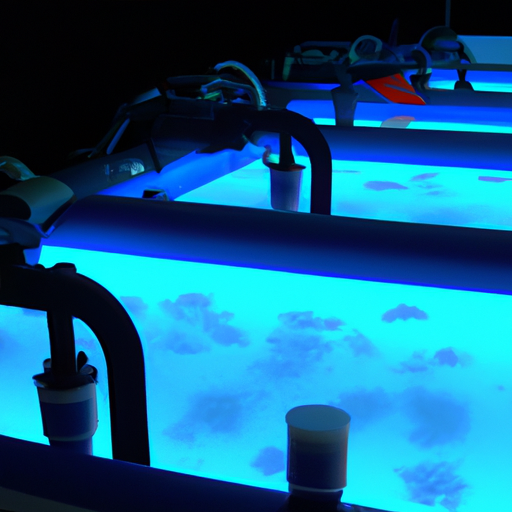The Benefits of UV Water Treatment for Homeowners
UV water treatment is becoming increasingly popular among homeowners due to its effectiveness in providing clean, safe drinking water. UV water treatment is a chemical-free process that uses ultraviolet light to kill bacteria, viruses, and other microorganisms in water. This process is highly effective in eliminating contaminants from water, making it safe for drinking and other uses.
The primary benefit of UV water treatment is that it is a chemical-free process. Unlike other water treatment methods, UV water treatment does not require the use of chlorine or other chemicals to disinfect the water. This makes it a much safer option for homeowners, as there is no risk of chemical contamination. Additionally, UV water treatment is a much more cost-effective option than other water treatment methods, as it does not require the purchase of expensive chemicals or equipment.
Another benefit of UV water treatment is that it is highly effective in eliminating bacteria, viruses, and other microorganisms from water. UV light is able to penetrate the cell walls of these organisms, destroying them and making the water safe for consumption. This process is also effective in eliminating other contaminants, such as heavy metals, pesticides, and other chemicals.
Finally, UV water treatment is a relatively simple process that can be easily installed in most homes. The process requires minimal maintenance and can be used to treat both well water and municipal water supplies. This makes it an ideal option for homeowners who are looking for a cost-effective and efficient way to ensure their water is safe for drinking and other uses.
Overall, UV water treatment is an effective and cost-efficient way for homeowners to ensure their water is safe for drinking and other uses. This chemical-free process is highly effective in eliminating bacteria, viruses, and other microorganisms from water, as well as other contaminants. Additionally, UV water treatment is a relatively simple process that can be easily installed in most homes. For these reasons, UV water treatment is becoming increasingly popular among homeowners.
How to Choose the Right UV Water Treatment System
When it comes to choosing the right UV water treatment system, there are several factors to consider. The most important factor is the size of the system. The size of the system will determine the amount of water that can be treated and the amount of UV radiation that can be used. It is important to choose a system that is large enough to treat the amount of water that is needed.
Another factor to consider is the type of UV radiation that is used. Different types of UV radiation have different levels of effectiveness. For example, UV-C radiation is the most effective type of UV radiation for killing bacteria and other microorganisms. However, it is also the most expensive type of UV radiation. Therefore, it is important to consider the cost of the system when choosing the right UV water treatment system.
The third factor to consider is the quality of the system. It is important to choose a system that is made from high-quality materials and is designed to last. This will ensure that the system will be able to provide effective water treatment for many years.
Finally, it is important to consider the maintenance requirements of the system. Some systems require regular maintenance, while others require minimal maintenance. It is important to choose a system that is easy to maintain and will not require frequent repairs.
By considering these factors, it is possible to choose the right UV water treatment system for your needs. It is important to research the different types of systems available and to compare the features and costs of each system. This will help to ensure that you choose the right system for your needs.
The Pros and Cons of UV Water Treatment

The use of ultraviolet (UV) light for water treatment has become increasingly popular in recent years. UV light is a safe and effective way to disinfect water, and it can be used to treat both drinking water and wastewater. While UV water treatment has many advantages, there are also some potential drawbacks to consider.
Pros
One of the main advantages of UV water treatment is that it is a chemical-free process. Unlike other water treatment methods, UV light does not require the use of chlorine or other chemicals to disinfect the water. This makes it a much safer and more environmentally friendly option. Additionally, UV light is effective at killing a wide range of microorganisms, including bacteria, viruses, and protozoa.
Another benefit of UV water treatment is that it is relatively easy to install and maintain. The equipment required for UV treatment is relatively inexpensive and easy to install. Additionally, the bulbs used in UV treatment systems typically last for several years before needing to be replaced.
Cons
One of the main drawbacks of UV water treatment is that it is not effective at removing certain contaminants from the water. While UV light is effective at killing microorganisms, it does not remove other contaminants such as heavy metals or chemicals. Therefore, it is important to use other methods of water treatment in addition to UV light in order to ensure that the water is safe to drink.
Another potential downside of UV water treatment is that it can be expensive to install and maintain. The equipment required for UV treatment can be costly, and the bulbs used in the system need to be replaced regularly. Additionally, UV treatment systems require a reliable source of electricity in order to operate.
In conclusion, UV water treatment is a safe and effective way to disinfect water. While it has many advantages, there are also some potential drawbacks to consider. It is important to weigh the pros and cons of UV water treatment before deciding if it is the right option for your needs.
The Latest Innovations in UV Water Treatment Technology
Ultraviolet (UV) water treatment technology is a rapidly evolving field that has seen a number of recent innovations. UV water treatment systems use ultraviolet light to disinfect water, making it safe for drinking, bathing, and other uses. This technology is becoming increasingly popular due to its effectiveness and cost-efficiency.
One of the most recent innovations in UV water treatment technology is the use of low-pressure UV lamps. These lamps are more efficient than traditional high-pressure UV lamps, and they require less energy to operate. This makes them more cost-effective and environmentally friendly. Low-pressure UV lamps also have a longer lifespan, meaning they need to be replaced less often.
Another recent innovation is the use of UV-C LEDs. These LEDs are more efficient than traditional UV lamps, and they require less energy to operate. They also have a longer lifespan, making them more cost-effective and environmentally friendly. UV-C LEDs are also more effective at killing bacteria and viruses, making them ideal for water treatment applications.
UV water treatment systems are also becoming more automated. Automated systems can be programmed to turn on and off at specific times, ensuring that the water is always treated with the correct amount of UV light. This eliminates the need for manual operation, making the system more efficient and cost-effective.
Finally, UV water treatment systems are becoming more compact. This makes them easier to install and maintain, and they can be used in a variety of applications. Compact UV systems are also more energy-efficient, making them even more cost-effective.
These are just a few of the latest innovations in UV water treatment technology. As this technology continues to evolve, it is likely that even more efficient and cost-effective solutions will be developed.
Understanding the Science Behind UV Water Treatment Systems
Ultraviolet (UV) water treatment systems are becoming increasingly popular as a way to purify water. This technology uses UV light to kill bacteria, viruses, and other microorganisms that can contaminate water. Understanding the science behind UV water treatment systems can help you make an informed decision about whether this technology is right for your home or business.
UV water treatment systems work by exposing water to UV light. This light has a wavelength that is shorter than visible light, and it is able to penetrate the cell walls of microorganisms. When the UV light comes into contact with the microorganisms, it disrupts their DNA, preventing them from reproducing and causing them to die. This process is known as “photolysis” and it is highly effective at killing bacteria, viruses, and other microorganisms.
UV water treatment systems are designed to be used in conjunction with other water treatment methods, such as filtration and chemical disinfection. This is because UV light is not able to penetrate particles such as sediment, dirt, and other debris. Therefore, it is important to ensure that the water is filtered before it is exposed to UV light. Additionally, chemical disinfection is often used to supplement UV treatment, as it can help to reduce the number of microorganisms that are present in the water.
UV water treatment systems are highly effective at killing microorganisms, and they are also relatively easy to maintain. The UV lamps used in these systems need to be replaced periodically, but this is a relatively simple process. Additionally, these systems are relatively inexpensive to install and operate, making them a cost-effective option for many households and businesses.
In conclusion, UV water treatment systems are an effective way to purify water. By understanding the science behind this technology, you can make an informed decision about whether it is right for your home or business.


Recent Comments